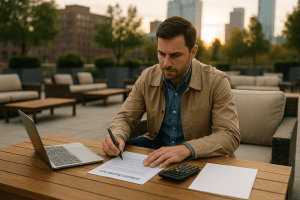
What Happens If I File Bankruptcy? Here’s What to Expect
What Happens If I File Bankruptcy and How It Affects My Life What happens if I file bankruptcy is a
Error: Contact form not found.
Lorem ipsum dolor sit amet, consectetur adipiscing elit. Ut elit tellus, luctus nec ullamcorper mattis, pulvinar dapibus leo.
What happens if I file bankruptcy is a question many people ask when debt becomes unmanageable. Bankruptcy can pause certain collection activities and address many types of debt through the court process, but it also has long-term consequences. Knowing what to expect before you file can help you make the best decision for your financial future.
In this guide, we explain what happens step by step when you file for bankruptcy, how it impacts your property, credit, and daily life, and how to rebuild after the process is complete.
Once you file for bankruptcy, several important legal actions go into effect. Here’s a breakdown of what happens next:
Immediately after filing, the court issues an automatic stay. This temporarily stops:
The automatic stay gives you breathing room while the court reviews your case.
A bankruptcy trustee is appointed to handle your case. Their role is to review your financial information, oversee creditor meetings, and manage any asset liquidation or payment plans.
This short hearing allows the trustee—and possibly creditors—to ask you questions under oath. It’s not a trial, and most cases proceed without issue.
Understanding what happens if I file bankruptcy includes recognizing how my finances will be affected afterward.
Most people who file for bankruptcy keep their essentials. However:
After your bankruptcy is complete:
Bankruptcy is a legal process designed to address overwhelming debt, but it is only one part of a broader financial picture. If you prepare well, act in good faith, and learn from past challenges, you can rebuild stronger. Some individuals are able to pursue future financial goals over time, depending on their circumstances.
If you’re asking what happens if I file bankruptcy, you’re already taking the first step toward regaining control of your finances.
Bankruptcy Attorneys connects you with licensed bankruptcy attorneys who can help you understand your options and the filing process.
Take the next step by starting a free evaluation today to learn more about your bankruptcy options.
Credit card debt is usually discharged in both Chapter 7 and Chapter 13, unless it involves fraud.
Not necessarily. Many filers keep their home, especially if they’re current on payments and the equity is exempt.
Yes, if your equity is protected and you continue making payments. Chapter 13 may help catch up on missed payments.
You can file again, but there are waiting periods between discharges depending on the chapters filed.
In most cases, employers are not notified unless your wages were being garnished or you filed Chapter 13 with payroll deductions.
Attorney Advertising. This site is a legal marketing service and does not provide legal advice. Submitting information does not create an attorney-client relationship. Results are not guaranteed.

What Happens If I File Bankruptcy and How It Affects My Life What happens if I file bankruptcy is a
| Cookie | Duration | Description |
|---|---|---|
| cookielawinfo-checkbox-analytics | 11 months | This cookie is set by GDPR Cookie Consent plugin. The cookie is used to store the user consent for the cookies in the category "Analytics". |
| cookielawinfo-checkbox-functional | 11 months | The cookie is set by GDPR cookie consent to record the user consent for the cookies in the category "Functional". |
| cookielawinfo-checkbox-necessary | 11 months | This cookie is set by GDPR Cookie Consent plugin. The cookies is used to store the user consent for the cookies in the category "Necessary". |
| cookielawinfo-checkbox-others | 11 months | This cookie is set by GDPR Cookie Consent plugin. The cookie is used to store the user consent for the cookies in the category "Other. |
| cookielawinfo-checkbox-performance | 11 months | This cookie is set by GDPR Cookie Consent plugin. The cookie is used to store the user consent for the cookies in the category "Performance". |
| viewed_cookie_policy | 11 months | The cookie is set by the GDPR Cookie Consent plugin and is used to store whether or not user has consented to the use of cookies. It does not store any personal data. |